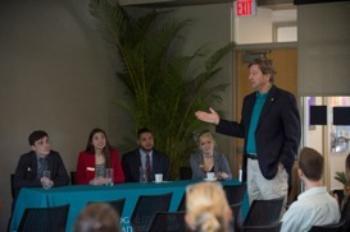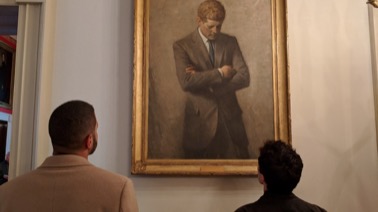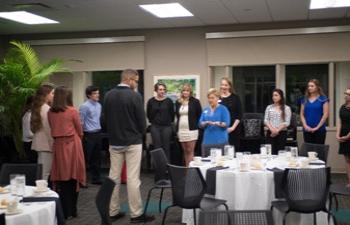Dyer Institute News
October 2021: Dyer Institute and the Living Shoreline
The Dyer Institute for Leadership and Public Policy at Coastal Carolina University is assisting The Nature Conservancy (TNC) with its living shoreline project in Georgetown. That assistance is coming in the form of helping TNC gauge public sentiment for the construction of the living shoreline in the Morgan Park area. At a recent meeting of community leaders, small handheld dials called perception analyzers were used to collect real-time reactions to a presentation. The Dyer Institute's involvement in the living shoreline project is just one aspect of the ways in which CCU is partnering with The Nature Conservancy. Faculty members and students from the Gupta College of Science are also involved in the project.
June 2020: SC-7 Survey Initiative
Following the Palmetto Trail as the guiding pathway from the mountains to the sea, the expedition will highlight the ‘SC7’ – so-named for the seven geographic wonders unique to the Palmetto State. The purpose of the expedition is to bring attention to the natural marvels that need our protection and the myriad outdoor adventures that await us from our own backyards and beyond. Along the route will be opportunities to discuss topics such as conservation, resiliency, adult and childhood fitness, outdoor therapy, floodwater-mitigation issues, and more. These discussions will take place through a series of fireside chats led by key partners in the outdoor and conservation industries. The goal of the fireside chats is to stimulate action that will take place long after the expedition ends. The Dyer Institute for Leadership and Public policy will administer a survey along the expedition and will gather input on knowledge of changes in climate and policy change needed to address those concerns.
- Website: https://www.southcarolina7.com/
- Facebook: https://www.facebook.com/SouthCarolna7/
- Instagram: @sc7wonders
- Preliminary Survey Results
April 2020: Webinar CARES Act
CARES Act Webinar
Need to Register? Click Here
The CARES Act, signed into law on March 27, 2020, has the potential to make a significant impact on the Grand Strand’s economy. From individuals to schools, businesses, industry, and municipalities, this aid package -- the largest the U.S. has ever seen – is designed to protect the American people from the public health and economic impacts of the COVID-19 pandemic.
CCU’s Dyer Institute for Leadership and Public Policy will hold a webinar to clearly present details and potential benefits of the CARES Act, including how it may affect the CCU community.
- Did you know that the CARES Act is NOT a stimulus bill?
- Did you know that the amount of money that will be distributed by the CARES Act is equivalent to 10% of U.S. GDP?
- Did you know that the CARES Act is the third phase of Congressional relief available?
*** Please join the Dyer Institute, in partnership with Downtown Strategies, for this hour-long webinar on Tuesday, April 28th, 2020, at 1:00 p.m. EST. Register in advance at coastal.edu/dyer.
April 2018: Annual Research Symposium
|
Fellows hear from Eddie Dyer at the Dyer Research Symposium. From left, John Quinn, Emily Taylor, Nicholas Smith, Alexandra Putman and Eddie Dyer. |
“The Dyer Research Symposium is the culmination of a lot of hard work” says Emily Taylor, a soon-to-be CCU graduate with a degree in public health. Taylor, a 2018 Dyer Fellow, presented her research on Pedestrian safety and the Need for School Zones on College Campuses at the symposium. Her research focused on S.C. 544, which flanks the CCU community and proposed a three-prong approach to safety that includes an education campaign for students and drivers, increased enforcement of posted laws by county and local police, and the integration of innovative infrastructure to keep pedestrians safe. Edgar Dyer, for whom the Institute was named, is a familiar face at the annual event. Taylor’s work was of particular interest to Dyer, who headed up the Ride III initiative in Horry County.
March 2018: The White House, Gallup… the Fellows “do” D.C.
|
Fellows Nicholas Smith and John Quinn admire the Kennedy portrait outside of the Red Room in the White House. |
The writing, the research, the meeting with faculty mentors… These elements of the Dyer fellowship are not always as thrilling as getting to wander around the most famous home in America, if not the world. One fellow said, “I cannot believe I am here! This is like stepping into history.” During the annual trip to Washington, D.C., Fellows visited and met with South Carolina representatives at the U.S. Capitol, took in a show at the Kennedy Center, and had a roundtable discussion with data scientists at the Gallup Agency, America’s oldest and most well-known public opinion research firm. These meetings and experiences of the trip are designed to help CCU students become fluent in communicating their public policy to decision makers. One of the fellows had this to say about the D.C. trip, “I think the most impactful element of my experience has been traveling to D.C…. This gave me the ability to go meet with people with similar interests and to develop the ability to speak eloquently with policy makers about my research. Prior to my experience with the Dyer Fellowship, I was unsure of how to speak with people in this way. The Dyer Fellowship really got me out of my shell. The Dyer Fellowship also helped further my research skills.”
In addition to Washington, D.C., fellows also travel to Columbia, S.C. to visit the S.C. Supreme Court and the General Assembly.
December 2017: Etiquette Dinner
|
Dyer Fellows listen to presentation on dining etiquette before sitting down to a five-course meal. |
The Dyer Fellowship offers noteworthy opportunities that contribute to the development of well-rounded CCU students as they prepare to graduate with undergraduate degrees. “Professional development has emerged as an area of focus for the Dyer Fellowship programming,” says Jacqueline Kurlowski, director of the Dyer Institute and founder of the fellowship program. In addition to an etiquette dinner, the fellows interact with other campus fellows at career services seminar on putting your best foot forward event. Kurlowski says, “Students receive robust academic training, but can sometimes miss out on basic networking and life skills. Our platform of professional development programming is offered in conjunction with other CCU fellowship groups and can fill in the gaps for students as they emerge in the world as professionals.” The Dyer Fellowship student reflections summarize this best:
“I believe the professional development events were helpful because they taught me how to conduct myself professionally. I enjoyed each of the events, and they were all very insightful. I have already had to use my dining etiquette skills in a professional environment. The elevator speech training was also helpful because it prepared me for the realistic time demands of having to get your point across to someone. I was able to practice this in D.C. between the scheduled trips and individual meetings.” – Dyer Fellow, 2017-2018
“I think the professional enhancement events were the most impactful because they put us a step ahead of other individuals who did not have this fellowship opportunity. I think that the networks made through this program are perhaps the most valuable. I have met many individuals who are not only friendly, but willing to help me reach my goals. I hope to maintain these connections and capitalize on the benefits of having extended professional relationships.” – Dyer Fellow, 2017-2018
November 2017: Dyer Institute welcomes the new group of Dyer Fellows, Class of 2018
The Edgar Dyer Institute for Leadership and Public Policy welcomes six new Dyer Fellows. During the one-semester fellowship, they will engage in active learning opportunities and gain knowledge in various areas of policy research. These students have diverse fields of interest ranging from public health to countering extreme terrorism. During the fellowship course (POLI-397-Q), the students will connect academic theory to practice and foster the importance of being civic-minded citizens and critical thinkers. Fellows will develop fully formed research papers on a public policy topic of their interests and will receive training on how to craft supplemental resources, including policy briefs, survey tools and a press releases. Students will also participate in group trips to Columbia, S.C., and Washington, D.C.
The following biographies highlight the Spring 2017 Dyer Fellows and demonstrate the caliber of each student associated with the program.
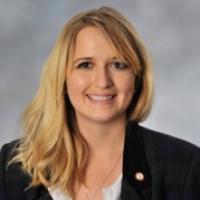 Alexandria Putman is a Coastal Carolina University student from Tega Cay, S.C. She studies political science and communication. Her interests include public opinion, the bureaucracy, as well as campaigns and elections. As part of her fellowship with the Dyer Institute for Leadership and Public Policy, Alexandria will examine the United States Postal Service as an institution within the bureaucracy. The USPS has increasingly come to be considered one of the most ineffective institutions in theU.S. today, as it loses a significant amount of capital per year. She hopes to find solutions to the problems in the postal service, such as its low public opinion and inefficiency. Upon graduating, Alexandria hopes to attend graduate school to study political science with a focus on political behavior and public opinion.
Alexandria Putman is a Coastal Carolina University student from Tega Cay, S.C. She studies political science and communication. Her interests include public opinion, the bureaucracy, as well as campaigns and elections. As part of her fellowship with the Dyer Institute for Leadership and Public Policy, Alexandria will examine the United States Postal Service as an institution within the bureaucracy. The USPS has increasingly come to be considered one of the most ineffective institutions in theU.S. today, as it loses a significant amount of capital per year. She hopes to find solutions to the problems in the postal service, such as its low public opinion and inefficiency. Upon graduating, Alexandria hopes to attend graduate school to study political science with a focus on political behavior and public opinion.
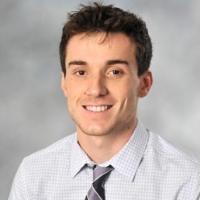
John Quinn is a Coastal Carolina student from Long Island, N.Y., who studies political science, marine science and sustainability. As part of his fellowship with the Dyer Institute for Leadership and Public Policy, John will be conducting research on sea level rise in Georgetown County. With this research, he hopes to educate the public on the necessary policy changes that are vital in community resiliency in the face of sea rise threat.
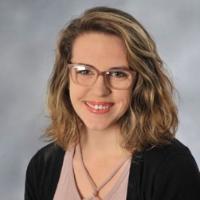
Allie Sheets is a Coastal Carolina University student from King, N.C., who studies political science with a concentration on domestic politics. She is interested in the inequalities in the criminal justice system. As part of her fellowship with the Dyer Institute for Leadership andPublic Policy, Allie will investigate the cash bail system. Her research will examine the role of bail in the criminal justice system, inequalities that arise from it and policy solutions for reform. Upon graduation, Allie plans to attend graduate school to pursue a Ph.D. in political science with a focus on political theory.
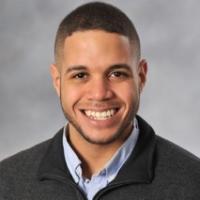
Nicholas D. Smith is a Coastal Carolina University student from Charleston, S.C. Nicholas is an intelligence and national security studies major with minors in global information systems (GIS) and philosophy. He is passionate about ethics and how they relate to public policy, specifically the ethics of artificial intelligence. As part of his fellowship with the Dyer Institute for Leadership and Public Policy,Nicholas will focus on how autonomous computing systems violate the privacy rights of American citizens. He hopes convey the importance of this issue to the public in an attempt to convey the theory that privacy does not exist in the digital world.
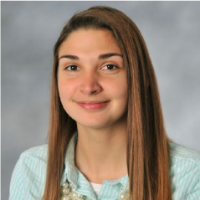 Emily Taylor is a Coastal Carolina University student from Andrews, S.C., who is majoring in public health and minoring in biology and psychology. She is interested in health policy and health disparities locally, nationally and globally. As part of her fellowship with the Dyer Institute for Leadership and Public Policy, Emily will research pedestrian safety across S.C. 544, which flanks a major portion of the CCU campus. She will examine the use of school zones for college campuses. Emily aspires to earn a master’s degree in physician assistant studies and will focus on preventative health for underprivileged populations.
Emily Taylor is a Coastal Carolina University student from Andrews, S.C., who is majoring in public health and minoring in biology and psychology. She is interested in health policy and health disparities locally, nationally and globally. As part of her fellowship with the Dyer Institute for Leadership and Public Policy, Emily will research pedestrian safety across S.C. 544, which flanks a major portion of the CCU campus. She will examine the use of school zones for college campuses. Emily aspires to earn a master’s degree in physician assistant studies and will focus on preventative health for underprivileged populations.
April 2017: Annual Dyer Research Symposium
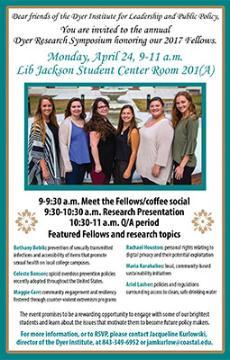 Dyer Fellows celebrated the end of their semester at the Dyer Research Symposium – the event was an opportunity for Fellows to present their semester-long research to the CCU Community. The 2016-2017 Fellows presented on topics ranging from big data privacy to community-based counter extremism efforts. “The Symposium is a year-end celebration of the fellows’ accomplishments as Dyer Fellows,” says Jacqueline Kurlowski, director of the Dyer Institute. “We were so pleased many CCU community members, including Edgar Dyer, President David DeCenzo, Provost Ralph Byington and Dean Dan Ennis were able to attend the event and support our awesome students.” The purpose of the Dyer Fellowship is to foster experiential learning opportunities and gain knowledge in various areas of policy research. If you are interested in becoming a Dyer Fellow, please visit here.
Dyer Fellows celebrated the end of their semester at the Dyer Research Symposium – the event was an opportunity for Fellows to present their semester-long research to the CCU Community. The 2016-2017 Fellows presented on topics ranging from big data privacy to community-based counter extremism efforts. “The Symposium is a year-end celebration of the fellows’ accomplishments as Dyer Fellows,” says Jacqueline Kurlowski, director of the Dyer Institute. “We were so pleased many CCU community members, including Edgar Dyer, President David DeCenzo, Provost Ralph Byington and Dean Dan Ennis were able to attend the event and support our awesome students.” The purpose of the Dyer Fellowship is to foster experiential learning opportunities and gain knowledge in various areas of policy research. If you are interested in becoming a Dyer Fellow, please visit here.
March 2017: Dyer Fellows visit D.C.
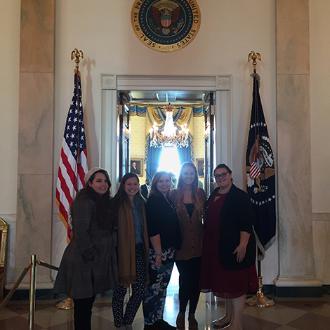
Fellows prepared to enter the Blue Room of the White House. Photographed (L to R): Celeste Benson, Maria Karahalios, Bethany Bebik, Rachael Houston and Ariel Lasher. |
It is no secret that CCU students love to travel, but if they are interested in public problems and public solutions, there is no better place to visit than Washington, D.C.
“Without a doubt, the D.C. trip is a major highlight of the fellowship program,” says Holley Tankersley, associate dean in the Edwards College of Humanities and Fine Arts. “Students gain so much from the networking opportunities facilitated by the Dyer Institute. This year, students met with staffers and directors from agencies such as the Federal Trade Commotion, the PEW Environmental Trust, and the Substance Abuse and Mental Health Services Administration. These are the professionals in jobs that our students hope to one day hold! It’s a tremendous opportunity for networking. As a bonus, these experts weigh in on the students’ policy research projects.”
In addition to seeing the opera Don Giovanni performed at the Kennedy Center, students had a personal tour of the U.S. Capitol building with Representative Tom Rice (R-S.C.), toured the White House, and met with a polling strategist from Anzalone Liszt Grove, the agency who managed President Barack Obama’s and Hillary Clinton’s opinion polling during their respective presidential campaigns. Plus, there was a lot of sightseeing.
Jacqueline Kurlowski, director of the Dyer Institute for Leadership and Public Policy, adds, “For a few of our students, this was their first time in our nation’s capital, and I am glad we could make the experience so special.”
February 2017: Dyer Fellows workshops offering skills training for the real world
A signature element of the Dyer Fellowship is the series of workshops where students are afforded the opportunity to enhance their academic research with real-world, practitioner-based tools. The Dyer Institute hosts four workshops for their fellowship students that cover a series of specialized topics. Workshops are an opportunity for Coastal Carolina University staff and faculty experts to share their professional knowledge with students, and this process is essential. Students do not typically receive training on these types of varied writing styles designed for professional audiences. Workshop coordinators craft interactive content for the fellowship students then move into one-on-one sessions with students to finalize their work. As a result of each workshop, Fellows produces a tangible product, e.g., a survey, brief, etc., which becomes part of the fellows’ policy research portfolio.
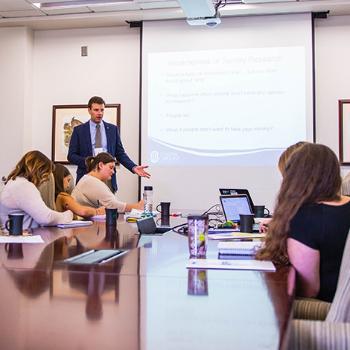
Drew Kurlowski, Ph.D., assistant professor of politics, leads a workshop on survey development. |
Workshop topics include:
- The Survey Development Workshop covers how to craft a survey tool and offers examples of survey methodology, sampling methods and provides students with training on how to avoid surveyor bias. By the end of the fellowship, a fully formed data collection tool (polling/survey) related to the fellow’s policy area will be developed.
- The Policy Brief Workshop covers how to craft a policy brief and reviews the importance of brief-styled writing and its usefulness when communicating to policy makers and elected officials. By the end of the course, a fully formed policy brief will be developed by the fellows who are able to use and distribute it to the broader community.
- The Press Release Workshop covers how to craft a press release and gives guidance on press releases and the methods behind effective issue framing in the media. By the end of the course, a fully formed press release will be developed by the fellows.
- The Professional Writing Workshop covers how to use APA writing style effectively in professional writing. This workshop trains fellows on writing styling and give them the chance to work through APA issues within their own research projects. By the end of the course, students will have developed and effectively formatted an APA-styled research paper and appendices.
February 2017: Monthlong lecture series to discuss Europe, China, trade and nuclear proliferation
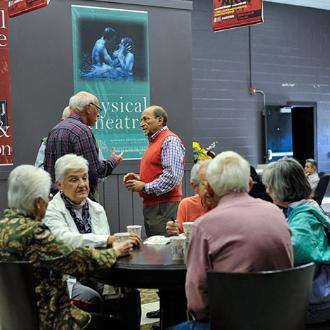
Great Decisions participants meet for the coffee social prior to the event |
The Dyer Institute for Leadership and Public Policy is co-hosting the Great Decisions in Foreign Policy Lecture program with the Osher Lifelong Learning Institute, Department of Politics, and the American Studies and Community Outreach office at CCU. Developed and disseminated by the Foreign Policy Association, the lecture program is the oldest and largest grass-roots world affairs educational program of its kind. A series of four lectures will take place during consecutive Saturdays in February, and each lecture is an opportunity to learn, discuss and debate international affairs, national security and U.S. foreign policy.
This year’s topics include “Future of Europe” (Feb. 4), “Trade and Politics” (Feb. 11), “Nuclear Proliferation” (Feb. 18) and “Conflict in the South China Sea” (Feb. 25). The series is for anyone who desires a deeper understanding of the current challenges the United States faces in the world today.
The lectures will be held at the Myrtle Beach Education Center (900 79th Ave. N., Myrtle Beach). A coffee social begins at 9:30 a.m. followed by a 10 a.m. to noon presentation. This event is free and open to the public. The Great Decisions program is offered in conjunction with Coastal Carolina’s American Studies curriculum. Please contact Carol Osbourne at (843)349-2658 for information on enrollment in AMST 302/502 and course credit.
January 2017: Dyer Fellows visit South Carolina Supreme Court and General Assembly
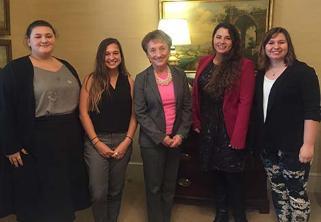
Fellows enjoy lunch with S.C. Supreme Court Justice Kaye G. Hearn. Photographed (L to R): Ariel Lasher, Maria Karahalios, Justice Kaye G. Hearn, Celeste Benson and Bethany Bebik. |
Just days into the first week of the Spring 2017 semester, the Dyer Fellows traveled to Columbia, S.C., for their first experiential learning activity. The morning was spent at the S.C. Supreme Court and the afternoon at the General Assembly. The day’s events proved to be a fruitful experience as students explored state-level policy considerations and examined the judicial process as it relates the organization of government and the separation of powers.
The day began with breakfast with Justice Kaye G. Hearn in her chambers. The group discussed the day’s cases and learned about Justice Hearn’s background and the workings of the state’s highest court. On the docket were three oral arguments regarding contract law, an unreasonable search and seizure potentially violating the Fourth Amendment, and a products liability case as it pertains to comparative negligence. Fellows attended the oral arguments and were specially welcomed and recognized by Chief Justice Donald Beatty at the call to order of court. Following oral arguments, fellows attended a private luncheon with Justice Hearn and her law clerks and continued the discussions about the fellows’ policy interests and how they related to currently pending, or previously heard, cases before the court.
Senator Luke Rankin (R-S.C.) represents District 33, which includes the CCU campus. Sen. Rankin is the chairman of Senate Judiciary Committee and originally developed the idea of bringing the Dyer Fellows to Columbia for a daylong visit. Frederick Wood, chair of the department of politics and faculty coordinator of South Carolina Student Legislature (SCSL), said “Offering students the chance to engage with legislators and their staffs is a valuable and worthwhile experience. For many students, this can spark interest in state-level governance and can open doors to future career paths.”
January 2017: Dyer Institute welcomes the new group of Dyer Fellows, Class of 2017
The Edgar Dyer Institute for Leadership and Public Policy welcomes six new Dyer Fellows. During the one-semester fellowship, they will engage in active learning opportunities and gain knowledge in various areas of policy research. These students have diverse fields of interest ranging from public health to countering extreme terrorism. During the fellowship course (POLI-397-Q), the students will connect academic theory to practice and foster the importance of being civic-minded citizens and critical thinkers. Fellows will develop fully formed research papers on a public policy topic of their interests and will receive training on how to craft supplemental resources, including policy briefs, survey tools and a press releases. Students will also participate in group trips to Columbia, S.C., and Washington, D.C.
The following biographies highlight the Spring 2017 Dyer Fellows and demonstrate the caliber of each student associated with the program.
-175x175.jpg) Bethany Bebik is a Coastal Carolina student from South Carolina who studies public health with a minor in women’s and gender studies. Bethany is passionate about sexual health, sexuality and gender. As a part of her fellowship with the Dyer Institute for Leadership and Public Policy, she will be studying the accessibility of condoms and dental dams on local college campuses. With sexually transmitted infections still a large issue in South Carolina, it is pressing that this be addressed.
Bethany Bebik is a Coastal Carolina student from South Carolina who studies public health with a minor in women’s and gender studies. Bethany is passionate about sexual health, sexuality and gender. As a part of her fellowship with the Dyer Institute for Leadership and Public Policy, she will be studying the accessibility of condoms and dental dams on local college campuses. With sexually transmitted infections still a large issue in South Carolina, it is pressing that this be addressed.
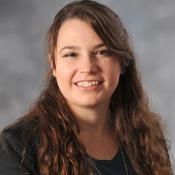 Celeste Benson is a Coastal Carolina University student originally from Greensboro, N.C., who studies public health. Her interests include public policy, advocacy, health promotion and disease prevention. After completing her degree, she hopes to attend law school and pursue a career in public interest law. Her research as a fellow with the Dyer Institute for Leadership and Public Policy will focus on opioid overdose prevention policies recently adopted throughout the United States. These policies, which are intended to prevent deaths from opioid overdoses, allow for increased access to Naloxone, a drug that reverses the effects of opioids. Through policy analysis and a thorough review of current data and statistics, she hope to assess whether or not these policies are, in fact, preventing opioid overdose deaths, while also further investigating what, if any, modifications could be made to simultaneously target addiction prevention.
Celeste Benson is a Coastal Carolina University student originally from Greensboro, N.C., who studies public health. Her interests include public policy, advocacy, health promotion and disease prevention. After completing her degree, she hopes to attend law school and pursue a career in public interest law. Her research as a fellow with the Dyer Institute for Leadership and Public Policy will focus on opioid overdose prevention policies recently adopted throughout the United States. These policies, which are intended to prevent deaths from opioid overdoses, allow for increased access to Naloxone, a drug that reverses the effects of opioids. Through policy analysis and a thorough review of current data and statistics, she hope to assess whether or not these policies are, in fact, preventing opioid overdose deaths, while also further investigating what, if any, modifications could be made to simultaneously target addiction prevention.
-175x175.jpg) Maggie Carr is a Coastal Carolina University student from Baltimore, Md., who studies intelligence and national security and psychology. She is a member of the varsity women’s lacrosse team and Alpha Delta Pi. Maggie is passionate about counter-terrorism and the radicalization process of individuals. As part of her fellowship with the Dyer Institute for Leadership and Public Policy, Maggie will be investigating the efforts of the local government to implement counter violent extremism programs in order to promote deradicalization through nonviolent means and engaging radicalized individuals or individuals at risk for radicalization in alternative ways. She hopes to define the significance of community engagement and resilience required to execute effective CVE programs. Her career aspirations include working in the intelligence community and eventually earning her master’s degree in security studies.
Maggie Carr is a Coastal Carolina University student from Baltimore, Md., who studies intelligence and national security and psychology. She is a member of the varsity women’s lacrosse team and Alpha Delta Pi. Maggie is passionate about counter-terrorism and the radicalization process of individuals. As part of her fellowship with the Dyer Institute for Leadership and Public Policy, Maggie will be investigating the efforts of the local government to implement counter violent extremism programs in order to promote deradicalization through nonviolent means and engaging radicalized individuals or individuals at risk for radicalization in alternative ways. She hopes to define the significance of community engagement and resilience required to execute effective CVE programs. Her career aspirations include working in the intelligence community and eventually earning her master’s degree in security studies.
-175x175.jpg) Rachael Houston is a Coastal Carolina University student from Northern Virginia who studies political science and communication. She is interested with the intersection of media and politics. As part of her fellowship with the Dyer Institute for Leadership and Public Policy, Rachael is investigating digital privacy rights. Her research will examine the lack of government regulation regarding digital privacy and reveal how companies are currently exploiting people’s digital data for financial gain. Upon graduation, Rachael plans on attending graduate school for American politics with a focus in political behavior and political communication.
Rachael Houston is a Coastal Carolina University student from Northern Virginia who studies political science and communication. She is interested with the intersection of media and politics. As part of her fellowship with the Dyer Institute for Leadership and Public Policy, Rachael is investigating digital privacy rights. Her research will examine the lack of government regulation regarding digital privacy and reveal how companies are currently exploiting people’s digital data for financial gain. Upon graduation, Rachael plans on attending graduate school for American politics with a focus in political behavior and political communication.
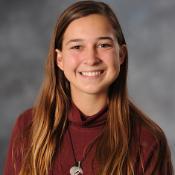 Maria Karahalios is a Coastal Carolina University student from New Jersey who studies political science and sustainability. As part of her fellowship with the Dyer Institute for Leadership and Public Policy, Maria will research successful sustainability initiatives in order to develop a plan specific to the business sector of downtown Conway, S.C. Through her research, she plans to give local business owners the tools to strengthen their community economically, ecologically and socially. Upon graduation, Maria seeks to further her education by attending graduate school and volunteering abroad with the Peace Corps.
Maria Karahalios is a Coastal Carolina University student from New Jersey who studies political science and sustainability. As part of her fellowship with the Dyer Institute for Leadership and Public Policy, Maria will research successful sustainability initiatives in order to develop a plan specific to the business sector of downtown Conway, S.C. Through her research, she plans to give local business owners the tools to strengthen their community economically, ecologically and socially. Upon graduation, Maria seeks to further her education by attending graduate school and volunteering abroad with the Peace Corps.
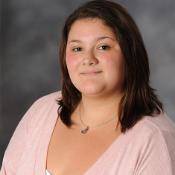 Ariel Lasher is a Coastal Carolina University student from Upstate New York who plans to be a public interest attorney. As part of her fellowship with the Dyer Institute for Leadership and Public Policy, Ariel will research current policies and regulations surrounding access to clean and safe drinking water for Americans. Assessing current policies and standards, Ariel seeks to determine advancements and changes that can be made to improve the current situation regarding access to clean and safe drinking water, such as that of Flint, Mich. In addition, Ariel will examine court precedent in hopes of concluding whether clean water is a constitutionally protected right.
Ariel Lasher is a Coastal Carolina University student from Upstate New York who plans to be a public interest attorney. As part of her fellowship with the Dyer Institute for Leadership and Public Policy, Ariel will research current policies and regulations surrounding access to clean and safe drinking water for Americans. Assessing current policies and standards, Ariel seeks to determine advancements and changes that can be made to improve the current situation regarding access to clean and safe drinking water, such as that of Flint, Mich. In addition, Ariel will examine court precedent in hopes of concluding whether clean water is a constitutionally protected right.
November 2016: The Dyer Institute's data analytics initiative kicks off in full color
 A Technicolor map installation in Brittain Hall kicks off the Dyer Institute’s new data analytics initiative. The five-series map installation describes median family income, poverty, lack of high school attainment, substandard housing, and veteran population, and will be on permanent display on the first floor of Brittain Hall. The maps, while beautiful to look at, describe nuances in the population at the Census track level. Tracks are sub-county divisions that are roughly equivalent to the size of neighborhoods.
A Technicolor map installation in Brittain Hall kicks off the Dyer Institute’s new data analytics initiative. The five-series map installation describes median family income, poverty, lack of high school attainment, substandard housing, and veteran population, and will be on permanent display on the first floor of Brittain Hall. The maps, while beautiful to look at, describe nuances in the population at the Census track level. Tracks are sub-county divisions that are roughly equivalent to the size of neighborhoods.
Director Jacqueline Kurlowski says that examining community-level data indicators is an appropriate starting point to understanding community dynamics.
“You must remember that indicators are nothing more than descriptive signals which can weave together a narrative about what is going on within a certain geography,” she says.
These maps are a starting point for creating mutual knowledge and understanding and can be used to measure progress in specific geographies of interest among specific populations of interest. Kurlowski says each indicator was selected for its representation of broader issues and is comparable at the national, state, county and local levels. This is important because “community-driven indicators can align programming and initiatives so that large and small public problems can be paired with appropriate public solutions.”
At the Edgar Dyer Institute for Leadership and Public Service, we believe that individuals across the community, state and nation can improve governance and solve problems by working together on a basis of mutual knowledge and understanding. Harnessing the power of public opinion and public data is important for local leaders, nonprofits and the community at large. The institute’s data analytics initiative performs data collection and analysis to support the institute’s policy consultation mission. In addition, it provides training in social science research methods for Coastal Carolina University students. The analytics section is able to leverage pre-existing data or conduct original data collection through polling, interviews and focus groups. Key areas of focus include the collection of data, statistical analysis and data visualization.
October 2016: Reflections from the 2016 Dyer Fellows as the 2017 application process opens
 Applications are now being accepted for the Spring 2017 group of Dyer Fellows. The Fellowship brings together a diverse group of Coastal Carolina University students to develop robust and relevant portfolios of work on a public policy topic of their interest and received specific training on how to craft supplemental research materials, including a policy brief, a survey and a press release. Fellows participated in fully funded trips to the state capitol in Columbia, South Carolina, and to Washington, D.C., to explore centers of policy formation and implementation at various levels of government.
Applications are now being accepted for the Spring 2017 group of Dyer Fellows. The Fellowship brings together a diverse group of Coastal Carolina University students to develop robust and relevant portfolios of work on a public policy topic of their interest and received specific training on how to craft supplemental research materials, including a policy brief, a survey and a press release. Fellows participated in fully funded trips to the state capitol in Columbia, South Carolina, and to Washington, D.C., to explore centers of policy formation and implementation at various levels of government.
Last year’s Dyer Fellowship students had the following reflections to share:
“The Dyer Fellowship impacted my life tremendously by giving me an opportunity to further my research interests, work with inspiring professionals in the academic field, and create stronger relationships with my professors. I feel that my work as a Dyer Fellow has highlighted my life as Coastal Carolina University student and has given me the opportunity to excel in my chosen degrees with academic honors. I gained self-confidence, pride, depth of knowledge and a clear understanding of what it means to be a scholar.” – Kelly Shelton, Dyer Fellow, 2016
“I am definitely more academically equipped now than I was before the fellowship. I have learned so much and have also had the chance to network with professionals who have so many different areas of expertise.” – Kelsey Callahan, Dyer Fellow, 2016
“This fellowship gave me an outlet outside of my normal courses and enabled me to say, ‘I can do more.’ The guidance by faculty and the encouragement to do something different was very rewarding. A singular takeaway from the fellowship was my sense of accomplishment and the knowledge that the University invested in me and the other Dyer Fellows in a way that contributed to our futures.” – Nicholas Blair, Dyer Fellow, 2016
The Dyer Institute is now accepting applications for the Spring 2017 fellowship group. Students seeking more information or who wish to apply online may visit this link. The deadline for applications is Nov. 1, 2016.
May 2016: Dyer Fellows Present Their Research at Symposium
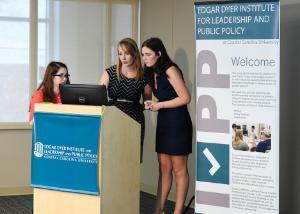 The inaugural Dyer Research Symposium took place on May 4, 2016 in the Lib Jackson Student Union. The Edgar Dyer Institute for Leadership and Public Policy’s mission is to engage students in active learning opportunities where they may gain knowledge in various areas of policy research. The institute brought together a group of Coastal Carolina University students from all colleges and degree fields to participate in the 2016 Dyer Fellowship Program. The program is noncredit granting and aims to provide students with experiences that connect academic theory to practice as well as to foster the importance of civic-minded citizens. Over the course of the spring 2016 semester, Dyer Fellows have developed a fully formed research project on a public policy topic of their interest. Additionally, Fellows received specific training and attended workshops on how to craft supplemental research materials, including a policy brief, a survey tool and a press release. It is the mission of the Dyer Fellowship to ensure our fellows graduate from Coastal Carolina University with a portfolio of work that is relevant and applicable to their field of interest. In many cases, the students’ bodies of work may be the starting point for continued graduate-level research.
The inaugural Dyer Research Symposium took place on May 4, 2016 in the Lib Jackson Student Union. The Edgar Dyer Institute for Leadership and Public Policy’s mission is to engage students in active learning opportunities where they may gain knowledge in various areas of policy research. The institute brought together a group of Coastal Carolina University students from all colleges and degree fields to participate in the 2016 Dyer Fellowship Program. The program is noncredit granting and aims to provide students with experiences that connect academic theory to practice as well as to foster the importance of civic-minded citizens. Over the course of the spring 2016 semester, Dyer Fellows have developed a fully formed research project on a public policy topic of their interest. Additionally, Fellows received specific training and attended workshops on how to craft supplemental research materials, including a policy brief, a survey tool and a press release. It is the mission of the Dyer Fellowship to ensure our fellows graduate from Coastal Carolina University with a portfolio of work that is relevant and applicable to their field of interest. In many cases, the students’ bodies of work may be the starting point for continued graduate-level research.
Presentations included:
-
- Questioning Attitudes: Surveying LGBTQ+ Students...
- Firearm Regulations: Closing the Loopholes
- Public Trust Resources, Sustainability and Sacrifice Zone
February 2016: Dyer Fellows Attend Team-Building Day at Wild Blue Ropes
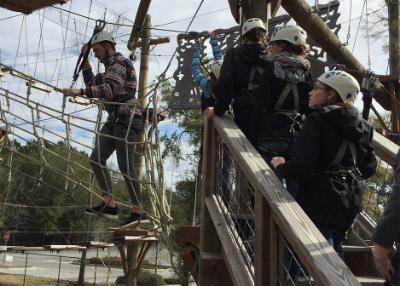 The Dyer Fellows visited the Wild Blue Ropes aerial obstacle course in Charleston, S.C., on Feb. 6, 2016. The goal of the field trip was focused on team-building and having fun on an aerial ropes course. The day started with team-building activities on the ground and then moved to the high-flying ropes, which consisted of more than 70 challenges at 35 feet off the ground. Using climbing gear, this no-nets course allowed the Fellows to climb, swing and navigate swinging bridges, tight wires and climbing walls. A good amount of brainpower and teamwork was needed to maneuver from one challenge to the next. Throughout the day, the Fellows encouraged each other and had fun on the adult-sized jungle gym. Dyer polling coordinator, Drew Kurlowski, attended with the group and said, “I noticed some of the students were skeptical at first, but by the end of the day many overcame fears of heights and had fun in the process. It was really a rewarding experience.”
The Dyer Fellows visited the Wild Blue Ropes aerial obstacle course in Charleston, S.C., on Feb. 6, 2016. The goal of the field trip was focused on team-building and having fun on an aerial ropes course. The day started with team-building activities on the ground and then moved to the high-flying ropes, which consisted of more than 70 challenges at 35 feet off the ground. Using climbing gear, this no-nets course allowed the Fellows to climb, swing and navigate swinging bridges, tight wires and climbing walls. A good amount of brainpower and teamwork was needed to maneuver from one challenge to the next. Throughout the day, the Fellows encouraged each other and had fun on the adult-sized jungle gym. Dyer polling coordinator, Drew Kurlowski, attended with the group and said, “I noticed some of the students were skeptical at first, but by the end of the day many overcame fears of heights and had fun in the process. It was really a rewarding experience.”
The Edgar Dyer Institute for Leadership and Public Policy’s mission is to engage students in active learning opportunities where they may gain knowledge in various areas of policy research. The institute has brought together a group of Coastal Carolina University students from all colleges and varying degree fields to participate in the 2016 Policy Fellowship Program. The goal of the program is to provide students with experiences that will connect academic theory to practice, as well as foster the importance of civic-minded citizens. Over the course of the spring 2016 semester, Dyer Fellows will develop a fully formed research paper on a public policy topic of their interest. Additionally, students will receive specific training on how to craft supplemental resources, including a policy brief, a survey tool and a press release.
January 2016: Dyer Institute for Leadership and Public Policy Granted Membership in National Organization
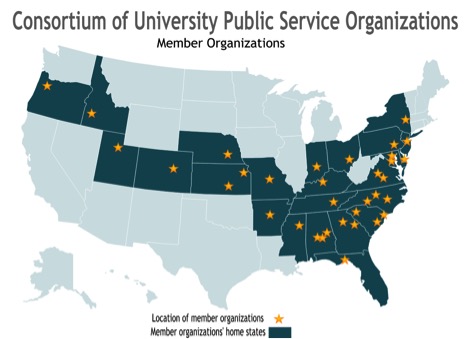
First organized in 1979, the Consortium of University Public Services Organizations draws together university-based institutes that share a similar mission of conducting public-sector research for the community at large while affording students experiential learning practicums in public service. The Dyer Institute for Leadership and Public Service at Coastal Carolina University is the newest member of this prestigious group of research institutions, which include the Strom Thurmond Institute of Government and Public Affairs at Clemson University and the Joseph P. Riley Jr. Center for Livable Communities at the College of Charleston. The Dyer Institute plans to bring about student-driven grant and contract-based work in Horry County, South Carolina, for state agencies and nonprofits. Jacqueline Kurlowski, Director of the Dyer Institute, hopes that “membership and scholarship among these institutes will afford the Dyer Institute opportunities for collaboration and may expand the scope of public-service initiatives for our CCU students and our community.” The Consortium of University Public Services Organizations’ mission is to support university-based public service institutes on a range of contemporary issues and challenges. The Dyer Institute’s membership will facilitate networking, information exchange and collaboration among its member institutions. As of the beginning of 2016, the organization has 33 member institutions in 24 states.



